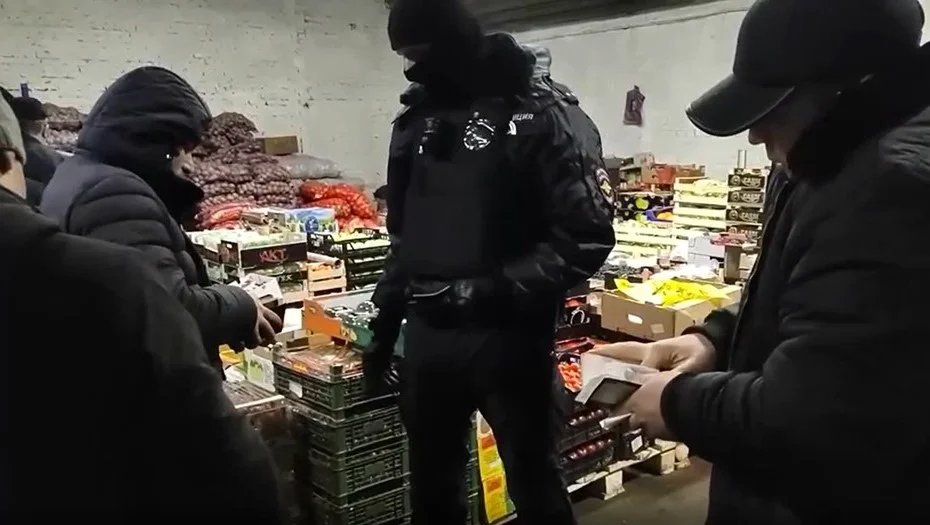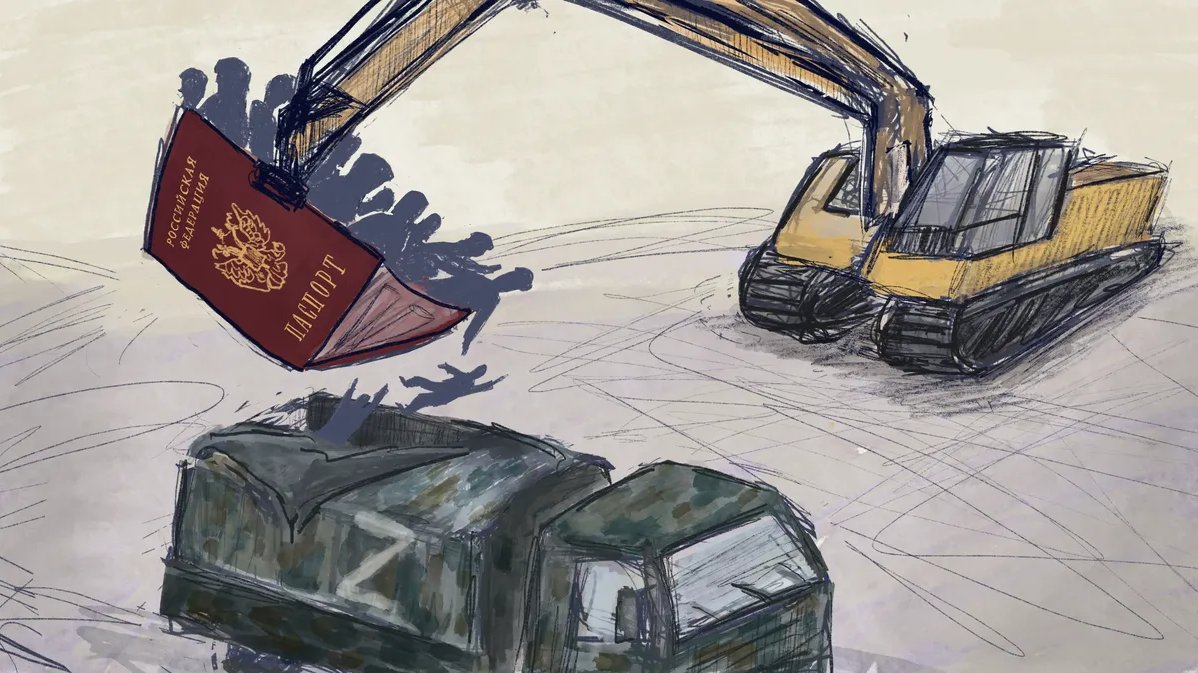In recent weeks the Russian authorities have been conducting raids and roundups ostensibly aimed at combatting illegal migration, the real targets of which appear to be recently naturalised Russian citizens who haven’t yet registered with their local draft office. Who are the people applying for Russian citizenship these days, and what are they risking by doing so?
Last month, police roundups euphemistically called “migration raids” took place in several Russian regions, with police and military conscription officials targeting food markets and agricultural warehouses, both places where migrant labourers are typically employed. Anyone found to have recently obtained Russian citizenship but who hadn’t registered with the local conscription office was reportedly either issued with draft notices on the spot or taken to the military authorities directly.
The Russian media has reported on various such round-ups in recent weeks, including one at a St. Petersburg vegetable warehouse in mid-August in which around 100 recently naturalised Russian citizens were detained. In late August, police in the city of Nizhny Novgorod rounded up around 20 “new Russians” and took them to the local military recruitment centre. Similar roundups have also been reported in four other regions of the country.
Speaking on condition of anonymity, one lawyer told Novaya-Europe that these tactics aimed at forcing immigrants to join Russia’s war effort dated back as far as February.

Authorities raiding a St. Petersburg vegetable warehouse last month. Photo: Russia’s Interior Ministry
Bureaucratic warfare
Officials in the Kaluga region appear to have gone one step further, however, and won’t now process applications for Russian citizenship unless applicants have already signed up for military service. Human rights activist Tatyana Kotlyar told news outlet 7x7 that she knew of at least five incidents of this happening.
In one case, an applicant for Russian citizenship who had been declared unfit for military service had his application declined as the military recruitment office hadn’t provided him with an exemption certificate.
"After he filed a complaint, he faced even more trouble and was accused of a misdemeanour he didn’t commit,” Kotlyar recalls, adding the man had complained of being treated “like scum” and had concluded that he no longer wanted to be “a citizen of a country like that”, ultimately deciding to return home.
Last September, Russian lawmakers passed a law fast-tracking the process of becoming a Russian citizen for those signing up for a one-year deployment to Ukraine. The military even opened a recruitment centre in Moscow’s office for migration that was aimed specifically at getting foreigners to sign contracts with the Russian army.
As those being recruited have yet to be granted Russian citizenship, such moves can only be described as mercenary recruitment, lawyer Shukhrat Kudratov says. In the wake of Russia’s mobilisation drive last year, the citizens of several Central Asian countries were warned by their governments against taking part in the war in Ukraine, which, they said, could result in them facing criminal charges in their home countries.
Who wants to be Russian anyway?
Following the invasion of Ukraine last year, Russian passports became “a toxic asset”, according to the Civic Assistance Committee, a Russian NGO focused on the rights of refugees and migrants. The Interior Ministry subsequently reported a 6% year-on-year drop in the number of passports it issued to new Russian citizens last year.
The uptake of Russian citizenship reported in 2021 remains unmatched. Residents of the breakaway Ukrainian regions of Donetsk and Luhansk have been eligible for fast-track naturalisation since 2019, since when a third of all passports granted to new citizens were issued in Russia’s southern Rostov region, which borders the occupied territories.
Since then, around a million Ukrainians have been granted Russian citizenship: making them responsible for over half of all successful citizenship applications overall. Last year, Russian President Vladimir Putin issued a presidential decree allowing all Ukrainian nationals to become citizens of Russia without having to provide proof of residence in the occupied territories.
The populations of the four Ukrainian regions annexed by Russia last September were issued with Russian citizenship en masse, automatically receiving their documents whether they wanted them or not. Russia’s Interior Ministry classified the detailed statistics on new passports in early 2023.
Bucking the trend
Tajikistan is the only country where Russian citizenship not only remained desirable in 2023 but actually grew in popularity. In the first half of this year, a total of 86,693 citizens of the Central Asian former Soviet republic were granted Russian nationality, a 17% year-on-year increase.
The Civic Assistance Committee attributes this rise to Tajikistan’s dire economic situation, widespread malnutrition, and chronic poverty.
Valentina Chupik, a lawyer who provides free legal assistance to immigrants, attributes the growing interest in obtaining Russian citizenship in Tajikistan to the reach of Russian propaganda in the country. Russian TV channels are a popular alternative to local media, Chupik says, and most people have poor internet access.
Tajikistan is also the only country Russia has struck a dual citizenship agreement with, according to which citizens of Tajikistan who have done their military service at home are exempt from mandatory military service in Russia after becoming Russian citizens, and vice versa.
This exemption only covers the one-year military service all young Russian men are obliged to perform, however, and doesn’t include mobilisation or reservist training, putting any dual citizen of Russia and Tajikistan resident in Russia at risk of being drafted to fight in Ukraine.
Support independent journalism
The chairman of Russia’s Investigative Committee, Alexander Bastrykin, suggested earlier this year that anyone granted Russian citizenship should automatically be conscripted to fight in Ukraine. A few months later, following the adoption of a law allowing draft papers to be delivered to conscripts online, an email sent by Russia’s public services website Gosuslugi informed dual citizens of Tajikistan and Russia that they would no longer be allowed to leave the country.
As the probability of a fresh wave of mobilisation recedes, political scientist Mikhail Vinogradov believes that immigrants will face increasing pressure to serve in the Russian military. The State Duma, Russia’s lower house of parliament, has even introduced a bill that would strip draft dodgers who have been recently naturalised of their citizenship.
One alternative proposal would require foreigners to complete their mandatory military service before being granted Russian citizenship. For now, however, that initiative is reckoned by lawmakers to present “too much of a threat” to would-be “new Russians”, according to independent Russian media outlet Verstka, and so the authorities are reluctant to implement the proposal for the time being. It’s anyone’s guess if that will still be the prevailing opinion in a year’s time, however.
Join us in rebuilding Novaya Gazeta Europe
The Russian government has banned independent media. We were forced to leave our country in order to keep doing our job, telling our readers about what is going on Russia, Ukraine and Europe.
We will continue fighting against warfare and dictatorship. We believe that freedom of speech is the most efficient antidote against tyranny. Support us financially to help us fight for peace and freedom.
By clicking the Support button, you agree to the processing of your personal data.
To cancel a regular donation, please write to [email protected]

